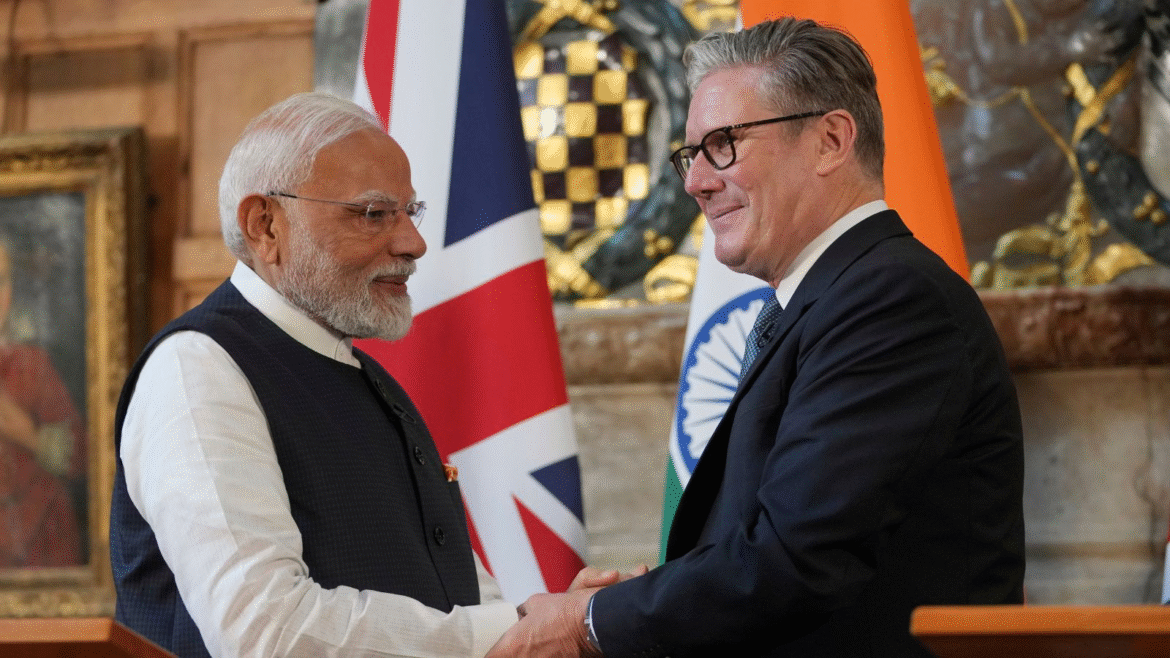AI Generated Summary
- Indian Prime Minister Narendra Modi, during high-level talks with his British counterpart Keir Starmer at Chequers, voiced strong concerns over the increasing activities of pro-Khalistan extremists in the United Kingdom and reiterated India’s longstanding demand for the extradition of economic fugitives sheltering on British soil.
- On Thursday, the two countries also signed a Memorandum of Understanding between India’s Central Bureau of Investigation (CBI) and the UK’s National Crime Agency to strengthen cooperation in tackling corruption, serious fraud, and organised crime.
- The two sides also discussed cooperation on repatriation of illegal migrants, with India reiterating its opposition to illegal migration and its commitment to work with UK authorities on the issue.
Indian Prime Minister Narendra Modi, during high-level talks with his British counterpart Keir Starmer at Chequers, voiced strong concerns over the increasing activities of pro-Khalistan extremists in the United Kingdom and reiterated India’s longstanding demand for the extradition of economic fugitives sheltering on British soil.
Speaking after the meeting, Modi underlined the need to prevent extremist elements from exploiting democratic freedoms. “Forces with extremist ideologies must not be allowed to misuse democratic freedoms. Those who misuse democratic freedoms to undermine democracy itself must be held to account,” he stated.
The meeting comes amid escalating tensions over Khalistani propaganda in the UK. In March 2023, pro-Khalistan radicals vandalised the Indian High Commission in London and tore down the Tricolour. Earlier this year, External Affairs Minister S Jaishankar was heckled by Khalistani supporters during his visit to the country.
No Room for Double Standards on Terrorism
The leaders also discussed global and regional security, with Modi stressing the need for a consistent approach in tackling terrorism. Referring to the Pakistan-sponsored terror attack in Pahalgam on April 22, Modi thanked Starmer for his unequivocal condemnation.
“We are united in our view that there can be no place for double standards in the fight against terrorism,” Modi said, with Starmer standing alongside him.
Foreign Secretary Vikram Misri later confirmed that counter-terrorism cooperation was a key focus of the talks. “Both leaders reaffirmed their commitment to fighting terrorism, extremism and radicalisation together,” he told reporters.
India Pushes for Extradition of Economic Fugitives
India also renewed its push for the extradition of high-profile economic offenders, including Vijay Mallya, Nirav Modi, Lalit Modi and Sanjay Bhandari, all of whom face fraud and money laundering charges in India.
“Extradition is not just about recovering defrauded funds; it’s about ensuring that economic fugitives cannot evade justice by fleeing abroad,” Modi stressed.
India has previously assured British authorities that it will uphold human rights standards and provide adequate prison conditions—issues that have delayed extradition proceedings in UK courts.
On Thursday, the two countries also signed a Memorandum of Understanding between India’s Central Bureau of Investigation (CBI) and the UK’s National Crime Agency to strengthen cooperation in tackling corruption, serious fraud, and organised crime.
Strategic Partnership and Vision 2035
The talks also saw the unveiling of the India-UK Vision 2035, a comprehensive 10-year roadmap to strengthen strategic ties. The plan focuses on economic growth, technological innovation, defence cooperation, climate action, education, and cultural exchanges.
“In order to infuse higher ambition and renewed momentum into our partnership, both leaders adopted the Vision 2035 document, which will guide bilateral relations for the next decade,” Misri said.
The two sides also discussed cooperation on repatriation of illegal migrants, with India reiterating its opposition to illegal migration and its commitment to work with UK authorities on the issue.
Strengthening Ties Amid Challenges
The Modi-Starmer meeting underscores a crucial moment in India-UK relations, as both nations attempt to deepen economic and strategic cooperation while addressing contentious issues like extremism and extradition.
With the Vision 2035 roadmap now in place, officials say the coming decade will test whether the two democracies can overcome these challenges while building a stronger partnership.




